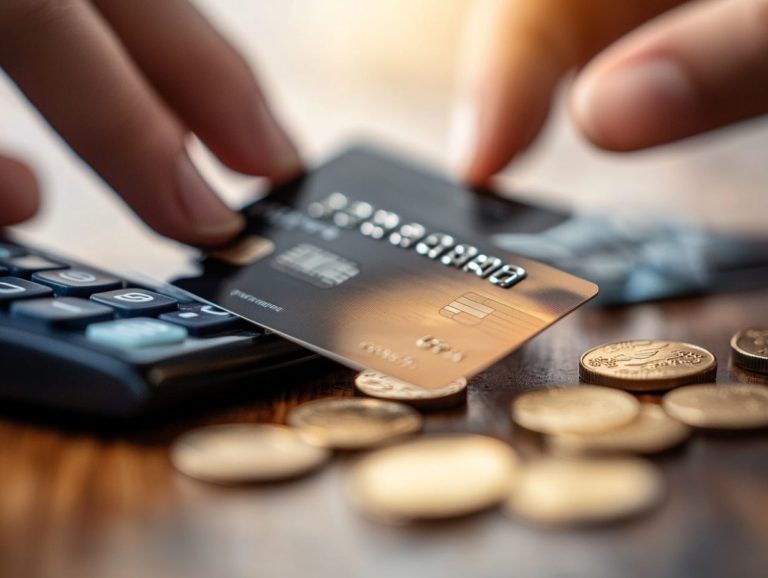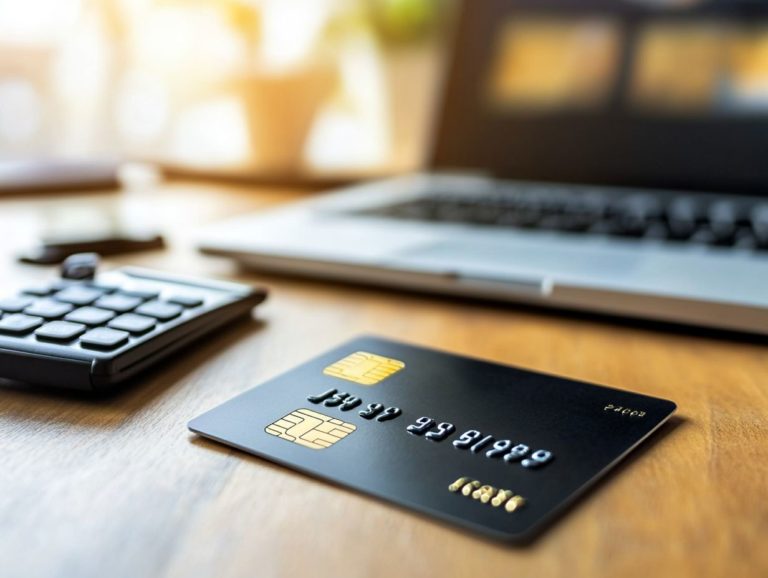How to Avoid Credit Card Scams?
Credit card scams represent an ever-evolving threat that can lead to significant financial losses and compromised personal information.
To effectively safeguard your finances, it’s essential to comprehend the various types of scams, from fraudulent attempts to get your personal information through fake emails or messages to skimming devices.
This article delves into the red flags you should be alert to, provides practical tips for protection, and outlines the necessary steps to take if you find yourself a victim.
Equip yourself with knowledge to thwart future scams and ensure your credit card information remains secure.
Contents
- Key Takeaways:
- Understanding Credit Card Scams
- Signs of a Credit Card Scam
- Keep Your Finances Safe from Credit Card Scams!
- What to Do If You Fall Victim to a Credit Card Scam
- Preventing Future Scams
- Frequently Asked Questions
- What are some common signs of a credit card scam?
- How can I protect my personal information to avoid credit card scams?
- What should I do if I suspect I am a victim of a credit card scam?
- How can I identify a legitimate credit card offer?
- What are some red flags to watch out for when it comes to credit card scams?
- How can I report a credit card scam?
Key Takeaways:

- Be aware of the various types of credit card scams to stay alert and protect yourself from falling victim.
- Look out for red flags such as unsolicited calls or emails requesting personal information; never give out sensitive information to unknown sources.
- To avoid credit card scams, take proactive measures like monitoring your account regularly, using secure websites for online transactions, and shredding documents with personal information.
Understanding Credit Card Scams
Knowing about credit card scams is crucial to keeping your money safe in today’s digital landscape, where cybercriminals are increasingly adept at exploiting weaknesses. It’s also important to learn how to use a credit card responsibly to protect yourself from potential threats.
In 2023, consumers in the U.S. faced substantial losses from credit card fraud an insidious form of identity theft. This type of fraud leads to the unauthorized use of credit card accounts and can snowball into even graver financial crimes through phishing scams and data breaches.
With the surge of online shopping and the prevalence of mobile wallets, recognizing and mitigating these threats has never been more critical.
Types of Credit Card Scams
There are several types of credit card scams that you should be on the lookout for in the U.S. These include phishing scams designed to lure you into revealing sensitive information, fraudulent transactions from data breaches, and identity theft schemes that exploit stolen credit card details.
Understanding this landscape of financial crimes is crucial for safeguarding your personal finances. Phishing scams often disguise themselves as deceptive emails or messages, tricking you into thinking you’re interacting with legitimate institutions. Fraudulent transactions can occur when hackers infiltrate databases of major retailers, leading to unauthorized credit card use. Meanwhile, identity theft schemes can see thieves leveraging stolen personal data to open new accounts, potentially resulting in significant financial losses for you.
Ultimately, staying aware and taking proactive measures are essential in combating these prevalent threats.
Signs of a Credit Card Scam
Recognizing the early signs of a credit card scam can greatly mitigate the potential fallout from unauthorized charges and identity theft, both of which are rampant in today s digital environment.
Look out for telltale signals such as unexpected fraud alerts from your financial institutions, unfamiliar charges on your credit card statement, and discrepancies in your credit report that could indicate unauthorized use of your credit card information.
Being proactive in spotting these indicators can help you safeguard your financial wellbeing.
Red Flags to Look Out For

Regarding preventing credit card fraud, recognizing the red flags is absolutely essential. Look out for unexpected emails or messages asking for personal information, unfamiliar transactions on your statements, and any alerts about potential data breaches linked to your accounts.
Remaining vigilant is key; even the smallest discrepancies could point to a larger issue. For example, if you notice that a legitimate company s email address looks slightly off or features an unusual domain, tread carefully. Similarly, unauthorized charges on your credit card statement or receiving a new card you didn’t apply for should raise immediate concerns.
Taking proactive security measures, such as regularly monitoring your account activity and setting up alerts from your bank, can drastically lower your risk of falling victim to these scams. If you spot any red flags, don t wait act immediately! Contact your financial institution and freeze your card to take decisive action and protect your personal information.
Keep Your Finances Safe from Credit Card Scams!
To keep yourself safe from credit card scams, take active steps. This involves implementing essential security measures, regularly monitoring your accounts, and learning how to avoid fraudulent credit card applications as a consumer in the U.S.
Consider these strategies:
- Set up fraud alerts
- Use secure mobile wallets
- Review your credit report regularly
These actions can significantly reduce the risk of unauthorized use and identity theft, ensuring your financial peace of mind.
Tips for Avoiding Scams
To avoid credit card fraud, embrace effective strategies. Be vigilant while shopping online, avoid public Wi-Fi for transactions, and stay alert against phishing scams that target your personal information. Additionally, learn how to protect your business credit card information to enhance your security.
Regularly monitor your bank statements for unauthorized transactions. Use strong, unique passwords for your online accounts. Enable two-factor authentication for extra security; this makes it harder for scammers to access your accounts. Always check that the websites you visit are secure look for URLs that begin with ‘https’.
Choosing credit cards over debit cards offers better fraud protection, as many credit card companies provide robust fraud detection services. By implementing these security measures, you can significantly lower your risk of falling victim to credit card scams.
What to Do If You Fall Victim to a Credit Card Scam
If you become a victim of credit card fraud, act quickly to minimize damage and address unauthorized charges effectively.
Report the incident to your financial institution immediately, file fraud reports, and monitor your accounts for additional signs of identity theft or unauthorized use.
Act quickly! Your prompt response can protect your financial well-being.
Steps to Minimize Damage

To minimize damage if you fall victim to credit card fraud, take immediate action by contacting your financial institution to freeze your account. File detailed fraud reports and regularly check your credit report for unauthorized activity.
Reporting unauthorized transactions is crucial to safeguard yourself from further losses. Update your passwords for online banking and shopping accounts to prevent additional breaches.
Consider placing a fraud alert on your credit profile, prompting lenders to verify your identity before granting credit. Keep a close eye on your bank statements and consider using identity theft protection services for added security, giving you peace of mind as you navigate this unfortunate situation.
Preventing Future Scams
Preventing future scams is a proactive endeavor that requires your ongoing vigilance and effective security measures. Actively monitor for fraud alerts and stay aware of potential data breaches that could jeopardize your identity.
By familiarizing yourself with the tactics used by cybercriminals, you can take the necessary precautions to protect your financial well-being.
Ways to Safeguard Your Credit Card Information
Safeguarding your credit card information in today s digital landscape requires a strategic approach. Start by utilizing secure mobile wallets for transactions. Avoid public Wi-Fi for sensitive activities, and implement strong security steps to shield yourself from credit card fraud.
Stay alert to protect yourself! Regularly monitor your bank statements and set up alerts for suspicious activity. Two-factor authentication adds extra security, while educating yourself about phishing scams helps you avoid falling victim to malicious attacks.
Keeping your software and applications updated is crucial, as these updates often include important security patches. By embracing technological advancements like encryption and tokenization, you can further minimize risks and ensure your financial information remains safe from prying eyes in our increasingly interconnected world.
Frequently Asked Questions
What are some common signs of a credit card scam?

- Unsolicited calls or emails requesting personal information
- Promises of large rewards or prizes in exchange for personal information
- Requests to pay upfront fees for a credit card or loan
How can I protect my personal information to avoid credit card scams?
To protect your personal information, only share your credit card details with reputable companies. Never disclose it over the phone or email. Use secure websites for online purchases, and regularly monitor your credit card statements for unauthorized charges.
What should I do if I suspect I am a victim of a credit card scam?
If you suspect you are a victim of a credit card scam, immediately contact your credit card company to report any unauthorized charges. File a complaint with the Federal Trade Commission and consider placing a fraud alert on your credit report.
How can I identify a legitimate credit card offer?
A legitimate credit card offer will clearly state the terms and conditions, including interest rates and fees. It will not ask for personal information upfront. Research the company offering the card to ensure they are reputable and have positive customer reviews.
What are some red flags to watch out for when it comes to credit card scams?
Red flags include:
- Requests for personal information
- Promises of guaranteed approval for a credit card or loan
- Pressure to act quickly without time to think about the offer
Be cautious of offers that seem too good to be true.
How can I report a credit card scam?
You can report a credit card scam to the Federal Trade Commission, your state Attorney General’s office, and your local law enforcement agency. Contact your credit card company to report any unauthorized charges or suspicious activity on your account.






